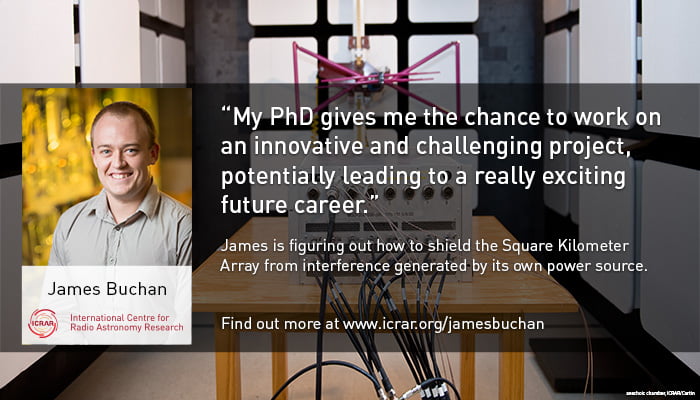 At a time early in his PhD when many students are focused on trawling through the literature, James Buchan is already thinking about his design for a low-interference inverter for the Square Kilometre Array (SKA).
At a time early in his PhD when many students are focused on trawling through the literature, James Buchan is already thinking about his design for a low-interference inverter for the Square Kilometre Array (SKA).
Radio telescopes need to be in radio-quiet areas where there is limited interference from everyday technologies like mobile phones, TV and radio stations.
The Murchison Radio-astronomy Observatory, where the Square Kilometre Array (SKA) is set to be built, is perfect for this, with just 110 people living in a shire half the size of Tasmania.
But it is also important to make sure electromagnetic interference is not introduced from components of the telescope itself—and this is where James’ research comes in.
James completed his honours in electrical engineering through ICRAR in 2014, working on electromagnetic interference suppression techniques for an early SKA prototype known as AAVS0.5.
He spent time working with renewable energy company Balance Utility Solutions before coming back to finish what he started, and do a PhD based around the next stage of the SKA design process, AAVS.0.
“The project that we’re working on involves designing and prototyping a solar hybrid stand-alone power system that will supply energy to the antennas.”
“The power system will contain a commercially available inverter, which is expected to generate electromagnetic interference requiring suppression technologies such as filtering and shielding”
“If this inverter generates too much electromagnetic interference and fails to meet electromagnetic compatibility standards for the SKA, we will have to come up with a new design for one that doesn’t interfere with the antennas “
James’ PhD is jointly supervised by ICRAR and the Curtin Department of Electrical and Computing Engineering, and James says he wanted to do research in radio astronomy because the SKA is such a large-scale and well-known project.
“I thought it would give me a great foot in the door in terms of radio astronomy engineering and electrical engineering in general,” he says.
“Undertaking a PhD research project provides me a chance to work on a really innovative and challenging project and it potentially leads into a really exciting future career.”